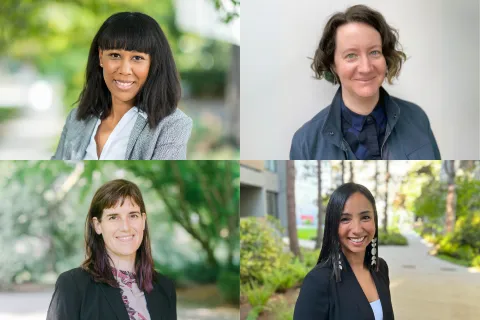From research to real-world impact: Meet four UBC Applied Science women inspiring inclusion

Architects and landscape architects. Community and regional planners. Engineers. Nurses. This International Women’s Day (IWD), we celebrate the achievements and contributions of women within UBC Applied Science.
The 2024 IWD theme, "Inspire Inclusion", highlights the importance of creating a world where everyone feels valued and respected, regardless of gender, race or background.
Our work and the professional disciplines we represent span the entire human-centred built environment, from planned and built communities, and how people live within them. This diversity of participation gives us unique insight into societal inequities — as well as the expertise to address them.
Meet four women from our Applied Science community who inspire inclusion:
Dr. Agnes D’Entremont, Associate Professor of Teaching, UBC Mechanical Engineering:
“Equity, diversity, inclusion and Indigeneity (EDI.I) education is critical for engineering students, as the impact of embedding inequity and colonization in the designs of engineering projects and processes, even unintentionally, can have long-lasting and widespread impacts. We are working to increase the participation of women and other historically marginalized groups in engineering, and we are making EDI.I education an explicit part of our curriculum, making it clear to students that inclusion and equity are critical to the success of engineering work. We need Canadian engineers to reflect the diversity of our communities and we need them to be trained to consider whose perspectives are missing.”
Ismália De Sousa, PhD Candidate, UBC School of Nursing:
“More young women live with the effects of a stroke compared with recent years, but they are under-researched. Studies have explored young stroke survivors' experiences, but few have focused on young women. Within this subpopulation, 2SLGBTQIA+ and visible minorities are also understudied. My doctoral research explores the experiences of a diverse group of young women stroke survivors accessing care through the patient pathway. The findings can provide recommendations to healthcare professionals and policymakers to inform the design and implementation of equitable systems of care, ultimately improving patient outcomes."
Dr. Sara Stevens, Associate Professor, School of Architecture and Landscape Architecture:
“Architecture is more than just buildings; it's about the people and the stories they tell. But this has been constrained by limits on whose stories we tell and who gets to tell them — something I see all the time when researching the history of architecture and urban design. We know that the voices of women and gender diverse people have historically been marginalized by a patriarchal society. Helping students to see that historical context is important, but so too is seeing that what is in the past does not have to be in the future. By including and elevating a diversity of voices, we can build the better world we all deserve where everyone feels welcomed and valued.”
Dr. Jessica Barudin, Assistant Professor of Indigenous Community Planning, School of Community and Regional Planning:
“I am Kwakwaka’wakw and a member and elected leader of the ‘Namgis First Nation. I believe in a values-driven, relationship-centered approach to community planning. My research interests include the empowerment and roles of women, who are the backbone of community planning, wellness, and governance, both historically and contemporarily. Through my work I aim to explore how empowering roles of women may promote positive shifts in community-healing, land stewardship, language and cultural transmission, and the futurities of their respective Nations.”
Building a more inclusive environment — both within our community of students, faculty and staff at UBC, and in the wider world — is a key priority for Applied Science.


